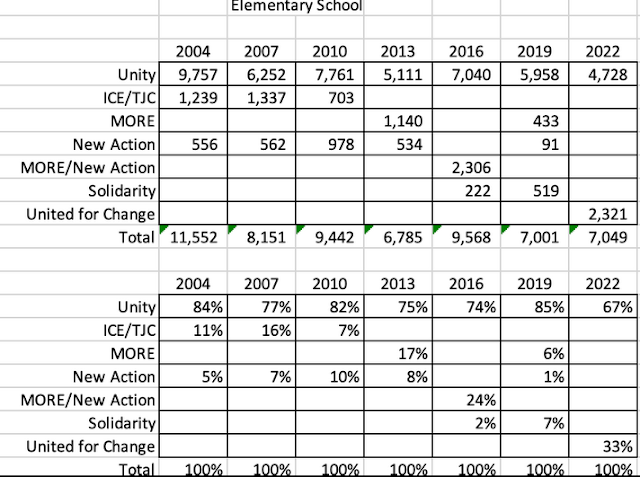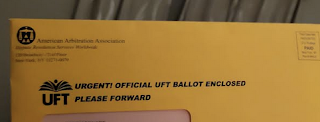- Unity got slammed, losing votes in all divisions compared to the past.
- I thought newbie UFCers who actually thought we would win would be crushed - instead many were excited and already talking about 2025.
- UFC didn't pick up what Unity dropped (except possibly in retirees and a little bit in high schools), just about matching the 2016 oppo numbers. Beware of those calling this a great victory. At this rate of growth I will be 121 when the oppo wins in 2046.
- UFC gained from 2019 oppo disaster and restored a sense of an opposition, getting the most votes the oppo has ever gotten, winning the high schools with 55% and almost winning the middle schools with 44% and closing the gap in elementary and winning 33% overall, the closest in a long time. Despite the gains, UFC did not get out the vote as well as I expected. I began the campaign thinking we could win all three teaching divisions. While we did get 44% of the teacher vote, that is due mostly to Unity's failure to bring out its vote, not due to UFC getting a big turnout - matching 2016 is still status quo - as iw winning the 7 HS Ex Bd as we did in 2016. Let's say UFC could win in 2025 or 2028 -- with these numbers? I'm not sure there is enough of a union underneath to deliver.
- Possibly the biggest achievement of the 2022 election may be the very existence of a United for Change broad coalition. While formed as a temporary vehicle for this election, there are signs UFC will continue in some form while giving each caucus space to develop. The 7 electeds represent all the groups and the candidates have pledged to continue working together. I love that they come from MORE, Solidarity, New Action, ICE - but also they are broad-minded to see outside their own caucus. Preliminaty meetings indicate excitement at working together.
- Is spending enormous time and money flooding teacher mail boxes with lit - for both Unity and oppo - really worth it. Also - we thought social media would bring out votes -- it didn't. Few will agree with me on these points but I will continue to stand by them. The numbers prove it.
- Read my pre-election comments posted July 2021: https://ednotesonline.blogspot.com/2021/07/uft-elections-part1-historical-analysis.html
Thursday, May 19, 2022
UFT Election Turnout: Some Observations May 15, 2022
UFT Election Turnout: Four Charts May 15, 2022
Analyzing UFT Election Results: My Data May 14, 2022
Then there are the numbers of people who wanted to vote and didn't get ballots plus the number of late ballots that came in. See below at the end of this article for an example from a guy who wanted to vote UFC.
Below are his charts for functional, retiree, elem, ms and hs, with numbers going back to 2004. You have to be UFT election freaks like us to dig into these numbers.
Let's go division by division. I suggest some reforms along the way.
Elementary - UFC had a shot but it was long
I began the campaign thinking we could win this even though the gap from 2016 was massive --5K vote difference. Unity got 7K and we got 2.5k in 2016. I was hoping Unity would look like 2013 with 5K and we could double our 2016 with a strong campaign.
It didn't happen and we missed a big opportunity as Unity dropped under 5k and we didn't even match 2016. I thought UFC had more outreach in elementary but if we did the GOTV didn't work. I got indications early on with the lack of contention in UFC by the caucuses for Elem Ex bd positions that there was not a sense of winning and when we struggled with petitions early on in that division, I pretty much gave up on winning this division.
34K elem ballots were sent out -- a lot of places to mine in the future. The oppos has a lot of work to do in elementary school. My suggestion: Choose a few key districts where UFC people have decent elem numbers and expand their networks with a local outreach program. Otherwise 2025 will be the same.
Middle school - Close but no cigar - Unity failure, but UFC makes no progress
We have election violations complaints but not enough to claim we lost due to those. I know there were schools where we could have/should have flushed out enough votes to win.
We thought we could win this and aimed our leafleting campaign at middle schools and literally got nothing more than we got in 2016. We barely cracked 900 votes in the entire MS division which has almost 11K. Unity totals were also abysmal --1200. We had 4 great Ex Bd candidates and it is a real shame we couldn't come up with 300 votes. I hear the biggest celebration inside Unity was that Daniel Alicea would not be on the Ex Bd -- after having voted for Unity in 2019, he became a leader of UFC and some in Unity seem to despise deserters. Unity isn't happy with HS winner Nick Bacon, still technically an elected Unity from 2019.

High Schools -- 55% for UFC waa big - I was hoping for 60%.
Ok - I'm a tough grader. Unity got slammed - under 2K - and they really wanted to win this one and there was great disappointment inside the fortress because HSVP Janelle Hinds is popular and people see this as a defeat for her personally.
Remember, her opponent Jonathan Halabi got 600 more HS votes than she did and pre-1994 he would be on the adcom - as her 2016 opponent James Eterno who got more HS votes than her would have been hten. (Unity changed the rules after Shulman won in 1985 to at large.)
Considered in the running as a Mulgrew successor, her fans at 52 and beyond were supposedly devastated by this loss. What were they thinking? Unity has fundamentally lost the high schools for almost 4 decades. If we had lost this time, UFC would have very little future.
I'm adding this point to original post: Unity recruited candidates for HS seats with intention of winning: they chose big school CL or former CLs. They were turned down by some people they asked. Jonathan and I estimated they would bring in some votes. They didn't. Does that reflect Unity failure? Did their own schools come out for them but few others? Or did their own colleagues reject Unity?
Still -- over 21k high school ballots mailed, we have loads of people in the HS and we end up with 2500 votes? We won but UFC people shouldn't risk dislocating their shoulders by too much patting themselves on the backs. Instead, figure out how to get 3-4K in future elections for HS to make up shorfalls in other divisions for a real shot at winning it all.
A major satisfaction is the election of Nick Bacon who ran with Unity and won for AFT in 2019. He was recruited by his Dist Rep. Imagine the egg on face. Unity seems to hate Nick almost as much as Daniel Alicea. Both of them were keys to bringing UFC together. While we see a number of former oppo people on the UFT Ex Bd with Unity, we now have our own reverse example in Nick -- maybe the first time we've seem an ex bd person go from Unity to oppo.
More from Jonathan
UFT Election Turnout: Four Charts
Let’s dive into the UFT election results. Let’s start with turnout. (For the beginning of the analysis, click here)
Votes Cast tells us more than Turnout Percentage







3 comments:
Thanks Norm. I am resuming analysis today. Some will match yours. I take some different angles as well. I think the scale of the Unity loss, since it is slow-motion, needs to be drawn out more fully.
I agree - erosion of Unity in schools. But also why people don't vote needs deeper analysis. I think more conscious choice than we think.
I'm adding this point to original post: Unity recruited candidates for HS seats with intention of winning: they chose big school CL or former CLs. They were turned down by some people they asked. Jonathan and I estimated they would bring in some votes. They didn't. Does that reflect Unity failure? Did their own schools come out for them but few others? Or did their own colleagues reject Unity?
Post a Comment